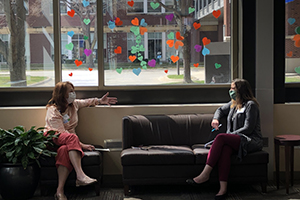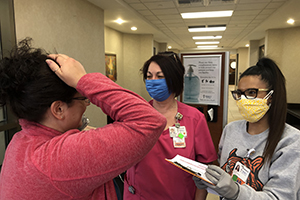By NANCY FOWLER
April 2, 2020
At Mercy Medical Center in Cedar Rapids, Iowa, volunteer seamstresses responded to a call for hand-made cloth masks. Now, having received more than 5,000 masks, Mercy is asking non-clinical staff, patients and even visitors to wear them both within and outside the hospital to help prevent the spread of COVID-19. Clinical staff are issued masks manufactured for health care use.

Mercy Medical Center employees Gretchen Bloomberg, left, and Lori Mahoney adapt to a new normal during the COVID-19 crisis as they wear hand-made masks and conduct an informal meeting while practicing social distancing.
"The public is concerned for themselves and for health care workers," said Dr. Timothy Quinn, Mercy's executive vice president and chief of clinical operations. "We want to protect our employees and the community by giving masks to guests as they come in."
Quinn said in addition to handwashing, social distancing and staying at home, masks can further lessen transmission by reducing the risk of virus-bearing droplets from an infected individual coming in contact with others.
Mercy's announcement arrives during a fervent national debate around public mask-wearing. The Centers for Disease Control and Prevention continues to recommend that unless individuals are sick, they should wear masks only when caring for someone who is. But the CDC is reviewing its policy to possibly encourage more people to wear masks. The CDC has said the infection can be spread by people who are asymptomatic and unaware they have novel coronavirus.

Mercy Medical Center mammographer Kristen Thole, center, and phlebotomist My'Lynn Conner, right, screen an employee at one of the hospital's entry points on March 24. The screeners ask all employees and visitors a series of health and travel-related questions as well as take their temperatures. Those who do not pass the screening are not allowed to enter as a precautionary measure during the coronavirus epidemic. The screeners wear hand-made masks that were donated to the hospital.
Other national experts are also weighing in. In an interview with National Public Radio this week, former U.S. Food and Drug Administration Commissioner Dr. Scott Gottlieb recommended that the public wear masks during the pandemic. Whether a person has symptoms or not, a mask "protects other people from getting sick from you," Gottlieb said.
Public mask-wearing is for the common good, Quinn agreed.
"Cloth masks will not protect you from breathing the virus in," Quinn said. "But they decrease the spread of droplets you are breathing or coughing out."
'Not appropriate for medical use'
Arguments against individuals wearing masks center on concerns that public demand for them could create a shortage of masks inside hospitals, where health care providers are much more vulnerable to infection. But Quinn emphasized that, according to CDC recommendations, doctors and nurses interacting with patients should never use the kind of hand-made cloth mask the public would wear.
"They are not appropriate for medical use at all," Quinn said.
In a pandemic in which policy changes daily, Mercy is already tiptoeing into providing masks to the public by encouraging hospital visitors to take the masks home, wash them and wear them in the community. But with Mercy's new rules limiting visitors to one per patient, none for COVID-19 patients and a ban on those under 16, overall visitor numbers have decreased considerably, so only some of the masks will leave the hospital.
Hoping that volunteers continue to sew and provide masks to the hospital, Mercy is open to the possibility that it could eventually offer masks to those in the community who would like one.
"If there is a point at which there is a recommendation for the community (to wear masks), we'd want to be a part of encouraging that," Quinn said.